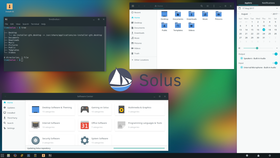Solus (operating system)
| Solus | |
|---|---|

|
|
 Solus 3 with the Budgie desktop environment |
|
| developer | Solus project |
| License (s) | Free software licenses, mainly GPL |
| First publ. | December 27, 2015 |
| Current version | Rolling-Release / 4.1 (Solus 4.1 Fortitude) (January 25, 2020) |
| Kernel | monolithic ( Linux ) |
| ancestry | GNU / Linux |
| Architecture (s) | AMD64 (64 bit) |
| compatibility | POSIX ( LSB ) |
| Installation medium | Live system for DVD or USB stick |
| Languages) | multilingual |
| Others | Desktop: Budgie , Gnome , MATE or KDE Plasma |
| getsol.us | |
Solus is a stand-alone Linux distribution that has been jointly developed since 2014 and began as a replica of Google Chrome OS . The operating system is available as an ISO image for the AMD64 architecture. It was started by Ikey Doherty, who however left the project towards the end of 2018. He handed the development over to the Solus team.
Components
Solus is based on the basic system tools of the GNU -project and the Linux - kernel .
For software installation, Solus uses the specially developed software eopkg as a package management system - PiSi is no longer supported.
Solus uses its own desktop environment called Budgie , which is based on GTK + 3.18 and uses various Gnome applications.
In the future, Budgie will switch from GTK to Qt .
development
Solus has been developed by the Solus team since the end of 2018. Although it is a rolling release system, updates are only released to the server on Fridays.
The development takes place via a "development portal" where anyone can request, submit or update a package.
history
| version | publication | End of support | annotation |
|---|---|---|---|
| 1.0 | December 27, 2015 | December 2017 | First version |
| 1.1 | March 2, 2016 | ||
| 1.2.1 | 19th October 2016 | eMMC devices are now recognized, dynamic changes to the keyboard layout, separate home partition, software updates, improved Steam integration | |
| 2017.01.01.0 | January 1, 2017 | unlimited because of rolling release | |
| 2017.04.18.0 | April 18, 2017 | ||
| 3 | 15th August 2017 | Support of the snap package format , Budgie 10.4 | |
| 4th | 17th March 2019 | Budgie 10.5 | |
| 4.1 | January 25, 2020 | Budgie 10.5.1 | |
| 5 | |||
|
Legend:
Older version; no longer supported
Older version; still supported
Current version
Future version
|
|||
literature
- Liane M. Dubowy: Newcomer . In: c't , 3/2016, p. 70.
Web links
Individual evidence
- ↑ Joshua Strobl: Solus 4.1 Fortitude Released. Solus Project, January 25, 2020, accessed January 25, 2020 .
- ^ Solus Linux is Under New Management. In: It's FOSS. November 9, 2018, Retrieved February 16, 2019 (American English).
- ↑ Using eopkg - Solus Forums. July 28, 2014, accessed April 21, 2017 .
- ^ Ferdinand Thommes: Solus OS 1.0 released. pro-linux.de, December 28, 2015, accessed on March 8, 2016 .
- ↑ ⚓ T7771 Update Telegram to v1.6.3. Retrieved April 27, 2019 .
- ↑ Josh Strobl: Solus 1.0 Released. Solus Project, December 27, 2015, accessed March 8, 2016 .
- ↑ Josh Strobl: 1.0 and Beyond. December 28, 2015, accessed March 8, 2016 .
- ↑ Josh Strobl: Solus 1.1 Shannon Released. Solus Project, March 2, 2016, accessed March 8, 2016 .
- ↑ Joshua Strobl: Solus 1.2.1 Shannon Released. Retrieved October 21, 2017 .
- ↑ Joshua Strobl: Solus Releases ISO Snapshot 2017.01.01.0. Retrieved October 21, 2017 .
- ↑ Joshua Strobl: Solus Releases ISO Snapshot 2017.04.18.0. Retrieved October 21, 2017 .
- ↑ Joshua Strobl: Solus 3 Released. Retrieved October 21, 2017 .
- ↑ Joshua Strobl: Solus 4 Fortitude Released. Retrieved March 17, 2019 .
- ↑ Joshua Strobl: Solus 4.1 Fortitude Released. Retrieved January 25, 2020 .